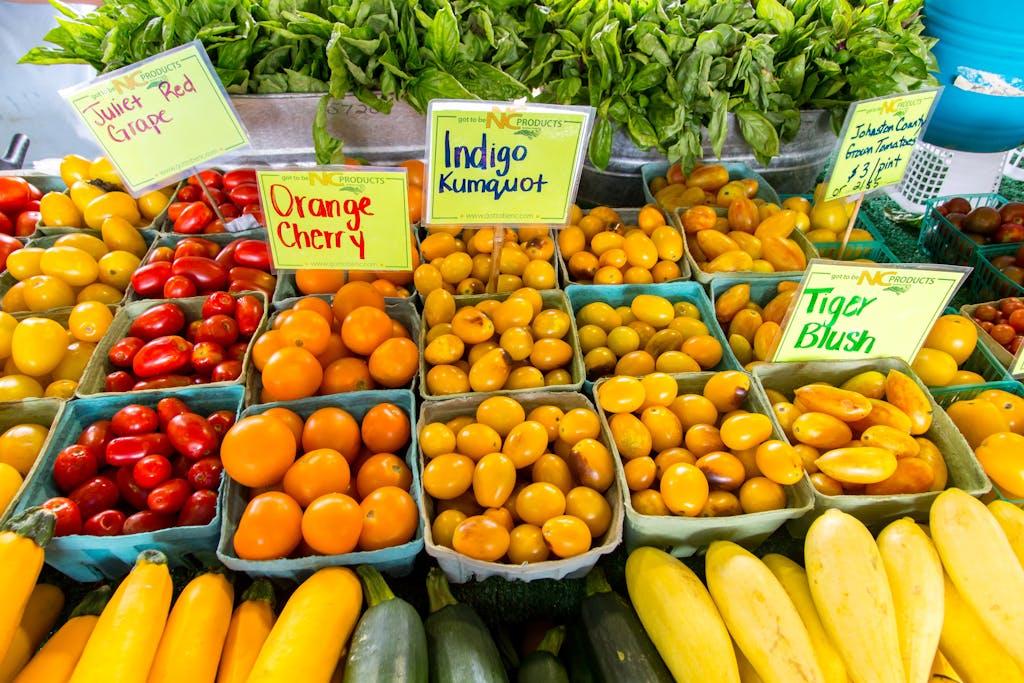Seasonal eating means enjoying locally-sourced foods that are naturally at their peak ripeness during the current time of year — like juicy local tomatoes in midsummer or crisp farm apples in the fall. This practice aligns our diets more closely with nature’s rhythms and is supported by both traditional wisdom and modern science.
- Seasonal eating enhances flavor, nutrition, and freshness of produce.
- It supports local agriculture and helps reduce environmental impact.
- Consuming seasonal foods can save money due to abundance and lower transportation costs.
Our registered dietitians promote seasonal eating whenever possible. Not only does it enhance flavor and freshness, but it also delivers tangible health, economic, and environmental benefits:
💪 Higher nutrition content
Produce harvested at peak ripeness often contains more vitamins, minerals, and antioxidants than off-season or long-haul counterparts (with the exception of fruits and veggies that are frozen at their peak!)
😋 Enhanced flavor and freshness
In-season fruits and vegetables are naturally more vibrant, juicy, and aromatic. Have you ever tasted locally grown arugula? So much more peppery than the average grocery option!
💰Lower cost
Foods in season are often more abundant and affordable due to local supply and reduced transportation costs. This is why tropical fruits like mango and avocado are so expensive in many parts of the U.S.
🌍 Environmental sustainability
Choosing seasonal foods can reduce the carbon footprint of your diet by minimizing the need for long-distance shipping and refrigeration.
🥗 Greater variety throughout the year
Rotating your food choices with the seasons helps you incorporate a diverse range of nutrients and flavors into your meals.
🧑🌾 Supports local agriculture
Seasonal eating often means eating local, which supports farmers and strengthens the regional food system.
Summer is a nutritional powerhouse
Summer might be our favorite time of year to eat seasonally. So many nutrient-rich favorites are finally at peak ripeness, from flavorful berries, peaches, and melons to fresh tomatoes, summer squash, and leafy greens. These summer staples are packed with nutrients that support hydration, digestion, and skin health. For example, watermelon is over 90% water and naturally rich in lycopene, an antioxidant linked to reduced inflammation and sun protection. Berries are loaded with fiber and polyphenols that benefit gut health and cognitive function.
A registered dietitian can help you tailor your eating plans to the summer season, saving you money at the grocery store while maximizing the health benefits of your meals.
What’s in Season? Essential Vitamins!
| Vitamin | Role | Summer Sources |
| Vitamin C | Supports immune health, skin repair, and antioxidant function | Strawberries, bell peppers, tomatoes, cantaloupe |
| Vitamin A | Important for vision, immune function, and skin health | Watermelon, mangoes |
| Vitamin K | Helps with blood clotting and bone health | Green beans, blueberries |
| Folate (B9) | Vital for cell growth and DNA formation | Corn, beets, cantaloupe |
| Vitamin E | Antioxidant that protects cells from damage | Bell peppers, mangoes, avocados |
| Vitamin B6 | Supports brain health and metabolism | Watermelon, mangoes, bananas, avocados, papayas |
| Vitamin D* | Supports bone health and immune function | (Safe) Sun exposure! |
| Potassium | Maintains fluid balance and muscle function | Tomatoes, zucchini, cucumbers, cantaloupe |
🌞 Fun fact: While Vitamin D is not naturally abundant in summer produce, time spent outdoors in the sun helps your body make it naturally.
See our full summer produce guide here
Quick tips from a registered dietitian:
- Keep berries dry until you’re ready to eat them (moisture speeds up spoilage).
- Pair summer fruit with protein or healthy fat (e.g., peach slices with cottage cheese or almonds) to support blood sugar stability.
- Use herbs like basil, mint, or cilantro to add flavor without added salt or sugar.
- Freeze summer veggies like corn, zucchini, and green beans to use later. Blanch first to preserve color, texture, and nutrients!
- Freeze berries, peaches, and cherries on a baking sheet, then transfer to a container or freezer bag for smoothies or oatmeal.
Summer eating and your health: insights from recent research
Here are some recent findings on the unique health benefits of summer foods:
How watermelon could help protect against prostate cancer. A 2020 review published in Biomedicine & Pharmacotherapy examined multiple studies and found that the antioxidant lycopene may help inhibit the progression and proliferation of prostate cancer cells, induce programmed cell death (apoptosis), and modulate cancer-related signaling pathways. These findings, while preliminary, support the inclusion of lycopene-rich foods like tomatoes, watermelon, and other red-hued summer produce as part of a preventive, seasonal diet, especially for men concerned about long-term prostate health.
Tomatoes as natural sun protection? A 2022 systematic review and meta-analysis published in Critical Reviews in Food Science and Nutrition found that tomato and lycopene supplementation may help protect the skin from sun-induced damage and aging. Reviewing 21 clinical intervention trials, the analysis showed that lycopene was associated with reduced skin redness (erythema), decreased pigmentation, and improved skin thickness and density, suggesting that regularly consuming lycopene-rich foods may offer natural, internal support for skin exposed to UV radiation.
Fermented foods promote microbiome balance and may stabilize gut health through seasonal changes. Lots of summer fruits and vegetables — like cucumbers, peppers, okra, peaches, and cherries — hold up well to fermentation. Recent research shows that beyond extending the life of seasonal produce (and providing a burst of flavor), fermentation offers a growing list of health benefits.
- This 2022 review published in Frontiers in Microbiology examined data on various fermented foods—like yogurt, kimchi, kefir, and fermented vegetables—and found that these foods contain beneficial microorganisms and bioactive compounds that can interact with and influence the gut microbiome. Some strains may only have temporary effects, while others can cause longer-term changes in the composition and function of the gut flora.
- A 2024 study of rural Indian adults found that regular consumption of fermented foods may influence how the gut microbiome responds to seasonal changes, especially during hot and humid summers. Interestingly, long-term fermented food intake was associated with lower overall bacterial diversity, but also with a more stable and predictable seasonal pattern in gut composition. These findings suggest that fermented foods could help regulate the microbiome during times of environmental and dietary change.
More advice for optimizing nutrition this summer
- Snack smart
Swap processed summer snacks like fudgesicles for nutrient-dense options that keep you full and satisfied. Try frozen Greek yogurt pops with berries, fresh fruit topped with chopped almonds and mint, or cucumber slices with hummus for protein, fiber, and healthy fats.
- Stay hydrated (without overdoing the sugar)
Water-rich foods like watermelon, cucumber, and strawberries can help you stay hydrated on a hot day. For drinks, opt for sweetener-free refreshers like seltzer muddled with mint, citrus, or berries. Coconut water is also a good option for replenishing electrolytes after sweating.
- Get outside
Taking your meals outdoors can support digestion, mental health, and even vitamin D levels. Even stepping onto your porch for a snack can boost your mood and help you eat more mindfully.
- Make a plan for summer BBQs and gatherings
Social events don’t have to conflict with nutrition goals. Build your plate with lean proteins (like grilled chicken or fish), load up on grilled veggies or fresh salads, and watch portion sizes. Bringing a dish you feel good about can help ensure there’s something nourishing on the table.
- Take advantage of nature’s sweet treats
Fresh summer fruits like berries, peaches, and cherries make delicious and naturally sweet desserts. Grill peach halves, freeze grapes, or make a simple fruit salad with a squeeze of lime. These options offer fiber and antioxidants—without the added sugar of typical desserts.
Dietitian’s Kitchen
Frozen Yogurt Berry Bites
Ingredients:
- 1 cup Greek yogurt (plain or vanilla)
- 1 cup mixed fresh berries (blueberries, raspberries, diced strawberries)
- 1–2 tsp honey or maple syrup (optional)
- Silicone mini muffin tray or parchment paper
Instructions:
- Mix Greek yogurt and sweetener (if using) in a small bowl.
- Spoon a small amount of yogurt into each compartment of a mini muffin tray.
- Top with a few berries and gently press them into the yogurt.
- Freeze for at least 2 hours, then pop out and store in a freezer-safe container.
- Enjoy straight from the freezer for a cool, protein-packed snack.
| Summer and food insecurity: supporting children without school meals Summer is a time of vibrant, fresh produce, but the change in season can also mean a shift in how kids access their daily meals. Families who utilize school-based breakfast and lunch programs from September to June may need to explore new ways to keep those nutritious meals going over summer break. The summer months are one of the highest-risk times for childhood food insecurity in the U.S. Fortunately, there are helpful programs and community resources designed to support families and ensure kids stay well-nourished all summer long. Resources for Families Facing Summer Food Insecurity: 🚌 1. USDA SUN Programs: Summer Nutrition for Kids Provides free, nutritious meals and snacks to children 18 and under at schools, libraries, parks, and community centers. Visit the USDA SUN website to find meals, meals-to-go, and grocery benefits near you 📲 2. Call or Text for Help Call 1-866-3-HUNGRY (1-866-348-6479)Text “FOOD” or “COMIDA” to 304-304 to find free meal locations near you via No Kid Hungry. 🛒 3. SNAP (Supplemental Nutrition Assistance Program) Helps families purchase groceries, including fresh produce. Apply or check your eligibility on the SNAP website. 🧃 4. WIC (Women, Infants, and Children) Supports pregnant women, postpartum parents, and young children. WIC benefits can now be used at many farmers’ markets! Learn more on the WIC website. 🥕 5. Local Food Banks, Pantries, and Community Fridges Many offer summer-specific programs, fresh produce distributions, and meal kits for families with children. Find your local food bank with the Feeding America network. Join Nextdoor for your neighborhood or your neighborhood Facebook group to see if there is a community-stocked open-access fridge. Nutrition is a right, not a privilege. If you or someone you know is struggling to access enough food during the summer months, these programs can provide vital support. For personalized nutrition guidance or help navigating available resources, our registered dietitians are here to help. |

Any general advice posted on our blog, website, or application is intended for reference and educational purposes only and is not intended to replace or substitute for any professional medical advice, diagnosis, treatment, or other professional advice. If you have specific concerns or a situation arises in which you require medical advice, you should consult with an appropriately qualified and licensed medical services provider.






